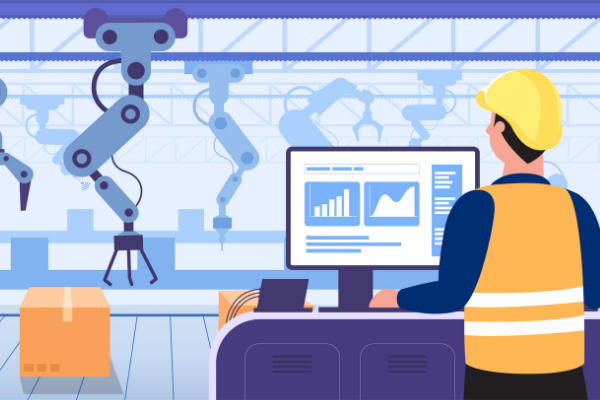What is Industry 4.0? | UM-Flint NOW

What is Industry 4.0 and What Does It Mean to You?
Have you heard of Industry 4.0, or the Fourth Industrial Revolution? Essentially, Industry 4.0 refers to the new digital era in which technologies transform the way we design, manufacture, and deliver products. Industry 4.0 leverages machine learning, IoT, and more to drive manufacturing smarter, more efficient, and more automated.
To understand more about Industry 4.0 or the fourth industrial revolution, we need some historical context of the major industrial advancements. Here's a brief review:
- The First Industrial Revolution (the late 1700s to the early 1800s)
Water power and steam power enabled people to mass-produce goods using tools and machinery instead of manual labor.
- The Second Industrial Revolution (the late 1800s to the early 1900s)
About a century later, oil, gas, and the invention of electricity powered the second industrial revolution. With the advent of the telephone, telegraph, automobile, and assembly line, the manufacturing process continued to mature.
- The Third Industrial Revolution/Industry 3.0 (1970-2010)
Information technology and computers enabled factories to start automating some production processes. Automation in this era still relied on human input and control.
- The Fourth Industrial Revolution/Industry 4.0 (2010-now)
Industry 4.0 is the next level of manufacturing automation. It places the emphasis on connectivity—bridging the gap between digital data and physical production. In Industry 4.0, we use a vast volume of data to make decisions and execute with higher accuracy, efficiency, and greater flexibility for customization.
Industry 4.0 is an ecosystem that connects all machines and people. Leveraging AI and machine learning, the organization collects and analyzes real-time data, using this information to drive operations. Moreover, business intelligence can predict future outcomes and make adjustment recommendations in real time.
Technologies Shaping Industry 4.0
Industry 4.0 is driven by a collection of technologies. Some examples include:
- Industrial Internet of Things: IoT is a network that connects all machines and devices. Key to smart manufacturing, IoT enables all components of a production line to collect, share, and exchange data.
- Artificial Intelligence and Machine Learning: AI and machine learning empower manufacturers to utilize data and information to increase productivity. The technology can train the data and perform analyses to help industrial machines operate automatically through learning algorithms.
- Cloud Computing: Since data is the backbone of Industry 4.0, we need a place where a tremendous amount of data can be stored and analyzed. Cloud computing plays a vital role in making that happen. It allows information to be accessible anytime and anywhere.
- Cybersecurity: When business operations are based on data and connectivity among different devices, it is vital to protect the cyber-physical systems from malicious attacks. Cybersecurity technology ensures a secure environment for smart production.
- Big Data Analytics: Big data extracts information from huge data sets. It transforms the complex information from IoT and cloud systems into actionable items that can be leveraged in business strategies.
What It Means to You—The Impact of Industry 4.0 on Manufacturing Careers
What does the transformation of Industry 4.0 mean to you? It's important to be involved and develop the skills needed in the workforce of today and the future, especially if you are interested in pursuing a career in engineering and information technology.
As the manufacturing industry adopts advanced technologies to scale business growth and production processes, the industry is experiencing a shift in the skill sets of manufacturing jobs.
There's a serious labor shortage of digital talent skilled in information technology, automation, and machine learning. Over two million positions are predicted to be unfilled due to the deficit of tech talent.
As a result, in Industry 4.0, bachelor's or master's degree-prepared workers competent in digital manufacturing and technology are highly in demand. According to a study from Deloitte, the top five skills manufacturing companies are looking for in candidates are technology/computer skills, digital skills, programming skills for robots/automation, working with tools and technology, and critical thinking skills.
UM-Flint Preparing You for Career Success in Industry 4.0
The University of Michigan-Flint College of Innovation and Technology offers the leading-edge Bachelor of Science in Digital Manufacturing Technology degree to help you build in-demand skills that can be applied to manufacturing and automation. This degree program fosters your ability to problem solve and optimize manufacturing processes with knowledge in programming, computer science, robotics, and product design.
Want to learn more about the Digital Manufacturing major? Request information today!
Related Posts
No related photos.
Logan McGrady
Logan McGrady is the marketing & digital communication manager for the Office of Marketing and Communication.